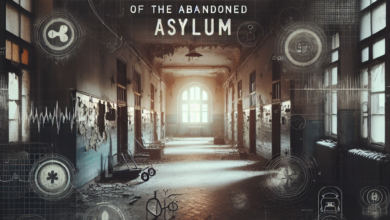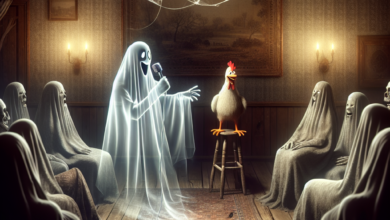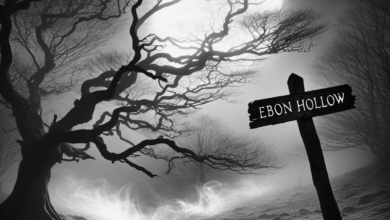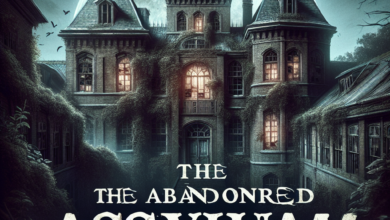The Phantom of Elderwood Manor
In the heart of the English countryside, shrouded by a dense thicket of mist and ancient trees, lay Elderwood Manor, a relic of a bygone era. Its towering spires pierced the skies like skeletal fingers, and its ivy-clad walls whispered secrets of the long-dead. Due to a tragic fire that took the lives of its last owners, the estate had become the subject of local lore—a ghostly haunt where the echoes of the past reverberated through the halls, and where the specter of Lady Amelia Ashworth roamed in search of love lost.
It was well-known among the townsfolk, especially the children, that to tread too close to Elderwood on a moonlit night was to invite misfortune. Yet, curiosity is a powerful emotion, and few could resist the lure of the manor’s haunting beauty. Among those drawn to the ghostly tales was Eleanor Hargrove, a bright-eyed historian with a particular fascination for the paranormal. She dreamed of uncovering the truth about the manor’s past and its spectral inhabitants.
Eleanor arrived in the village of Windermere late one autumn afternoon. The trees were ablaze with colors—golds, reds, and burnt oranges—that danced in the crisp wind, and the air smelled sweet with fallen leaves. She carried a leather satchel filled with notebooks, a camera, and various ghost hunting gadgets, all eagerly awaiting to unveil the secrets of Elderwood.
“The manor’s haunted, they say. Best stay clear of it, love,” an old woman warned her, shaking her head disapprovingly as she passed Eleanor on the cobblestone street.
Undeterred, Eleanor smiled politely and thanked the woman before making her way to the village library. She hoped to glean some information from the dusty tomes and faded newspaper clippings regarding Elderwood Manor and its last inhabitants.
Hours melted away as she poured over yellowed pages filled with accounts of the Ashworth family—Baron Henry Ashworth, his beloved wife Amelia, and their only son, Charles, who had perished in the flames that consumed their lives and home. The more she read, the more she felt an inexplicable bond with Lady Amelia. There was something about her spirit that lingered in Eleanor’s heart, a yearning she somehow understood.
As the sun sank below the horizon, casting long shadows that merged with the darkness, Eleanor closed the library and made her way to Elderwood Manor. The path was overgrown and treacherous, the air thick with the scent of damp earth. With each step, a sense of anticipation thrummed in her veins, a mix of excitement and trepidation.
Upon reaching the grand entryway, she paused to take in the manor’s haunting beauty. The front door creaked open at her touch, revealing an expansive foyer drenched in moonlight. Dust motes danced in the air, and a grand staircase spiraled upward, its balustrades intricately carved with delicate floral motifs.
“Hello?” Eleanor called softly, her voice echoing through the empty halls. The only response was the distant sound of dripping water, an eerie reminder of the manor’s decay.
Her heart raced as she ventured further, armed with her camera and a flashlight. The air felt heavy, thick with the fragrance of mothballs and time. Each creak of the floorboards beneath her feet felt like an intrusion upon the memories sealed within the walls. She made her way into the parlor, where faded portraits of the Ashworth family peered down at her with somber expressions.
As Eleanor examined the portraits, she sensed a presence behind her. She whipped around, her heart pounding. Nothing. Just shadows cast by the moonlight filtering through shattered windows. Dismissing her nerves, she pressed on, documenting her exploration in the hope of capturing a fragment of the manor’s lost magic.
In one of the rooms, she found an ornate mirror draped in a sheet. With tentative fingers, she pulled the fabric away, revealing a reflection that flickered in and out of focus. It wasn’t just her own image she saw; layers of emotions swirled within the glass—a flash of a woman in a flowing gown, her eyes shimmering with unshed tears. Eleanor blinked, and the apparition vanished, replaced by her own bewildered expression.
Heart pounding, Eleanor whispered, “Lady Amelia?” Her voice wavered with reverence and intrigue.
The air turned cold around her, a chill creeping into her bones, as if the manor breathed an icy sigh in response. She took a cautious step back, yet found herself rooted to the spot. Somewhere within the depths of her mind, a voice whispered insistently, urging her to stay, to listen.
Eleanor spent the night exploring every nook and cranny of Elderwood, her flesh prickling with the sensation of being watched. She discovered remnants of the Ashworth family’s life: an old diary belonging to Amelia, a locket bearing the likeness of young Charles, and delicate porcelain figurines adorning the dusty mantle. Each find deepened her emotional connection to the family—a bond that pulled her closer to the ghost at the heart of the manor.
As dawn broke, painting the sky with hues of lavender and gold, Eleanor made her way back to the parlor, the lure of the mirror drawing her again. She gazed into it, a yearning ache thrumming within her chest.
For a moment, the world around her faded. She could almost hear whispers, voices calling her name like a forgotten lullaby. There it was again—the flicker of a woman in the gown, her face hauntingly beautiful and sorrowful. Eleanor leaned closer, entranced.
“Amelia?” she breathed, her heart hammering. “Why do you linger here?”
The mirror glowed, and in a blink, the reflection shifted; Eleanor saw a vignette from the past unfold before her. She watched as Amelia danced in the ballroom, her figure elegant and ethereal. Laughter echoed, mingling with the soft strains of a piano. But then, the joy shifted to despair as flames erupted, devouring the shadows of the ballroom, and the revelry turned to chaos. Bodies scattered, screams filled the air, and the visage of Amelia slipped away, consumed by the fire’s fury.
Eleanor fell back, gasping for breath. “No…” she whispered, shaking.
The manor felt alive, resonating with grief and pain. It was a prison for a soul unable to escape the memories that bound it to this world. The more Eleanor uncovered, the more she realized that the love of the Ashworths had transcended life itself; they had meant to protect one another until the bitter end.
Determined to help Amelia find peace, Eleanor dedicated herself to uncovering the full story of that fateful night. She reached out to the villagers, piecing together remnants of the past—the gossip between the bars, the hushed conversations about the manor, and tales of the fire.
The more she learned, the more she understood the tragedy of the Ashworths. The fire had not been accidental; it was a result of a feud between Henry Ashworth and a rival family in the village. Years of resentment culminated in a cruel plot—a deliberate attempt to destroy everything the Ashworths cherished. Amelia had tried to save her family, her love igniting in the flames along with the manor.
But the revelations did not come without risks. The villagers were wary, feeling a sense of foreboding at Eleanor’s investigation. Whispers of curses followed her, shadows growing darker during her nightly visits to the manor. The more she learned, the more the townsfolk pressed her to leave Elderwood alone, dismissing her as a foolish girl.
“Leave it be, lass!” Old Mr. Collins admonished her one evening at the local pub, his gnarled hands trembling as he clutched his tankard. “You stir the shadows that ought to stay buried. The Ashworths don’t want your interference.”
But Eleanor pressed on, her spirit undeterred. She felt a bond with Amelia, a sadness that no one else could comprehend—a longing for closure, a desire to make things right.
One night, as the full moon cast an ethereal glow across the manor, Eleanor returned to the parlor, the mirror shimmering with an inviting light. She approached it, her heart racing with a sense of purpose.
“Amelia,” she pleaded, the reflection swirling with energy. “I know your pain. I want to help you find peace. Tell me what I must do.”
In that moment, the reflection morphed, revealing the charred remains of the ballroom, the echoes of laughter still haunting the air. Eleanor felt the energy building, a palpable force around her, swirling like a tempest.
Suddenly, the temperature dropped, the room filled with an overwhelming sorrow. The ghostly figure of Amelia appeared, her face a mask of sadness and fury.
“WHO DARES?!” her voice rang out, ethereal yet full of anguish.
“I do!” Eleanor cried, stepping forward. “I want to help you. I understand the truth of what happened! You didn’t deserve this pain. You fought for your family.”
Amelia’s expression shifted, the rage softening into something deeper—a profound sadness that pierced Eleanor’s heart.
“Help… me…” came the whisper, a plea laced with despair.
“How?” Eleanor asked, her voice hoarse with emotion.
Amelia gestured towards the mirror, which shimmered ominously, revealing snippets of memory—an anniversary celebration, a tender moment between husband and wife, the warmth of sunlight spilling into the gardens, juxtaposed against the inferno that had stolen them all.
“Reveal… the truth…” Amelia urged, her ghostly form flickering like the flames that had taken her life.
Eleanor understood then; the truth had to surface, the name of the rival family who had conspired against the Ashworths must be revealed, to break the chains binding Amelia’s spirit to the manor.
“You’re not alone,” Eleanor promised, tears streaming down her face. “I’ll make them remember. I will not let your love be forgotten.”
The room trembled with a rush of energy—the bond between Eleanor and Amelia formed a bridge between the living and the lost.
Days turned into weeks as Eleanor gathered evidence, uncovering the lies and schemes hidden away in the village’s history. Finally, the truth spilled forth like a flood, and the townsfolk were compelled to confront the past they had long buried.
With the unveiling of the conspiracy came an unexpected twist; the rival family, filled with shame and regret, organized a memorial for the Ashworths, a public acknowledgment of their wrongdoing. The event took place before the skeleton of Elderwood Manor, a reminder of both tragedy and resilience.
Eleanor stood among the townsfolk, amidst the flickering candlelight and mingled memories, her heart heavy yet resolute. As she watched the village honor the Ashworths, she felt the air shift around her, a warmth rising against the chill of the night.
Then she heard it—soft laughter among the crowd, and a shimmering light danced along the edges of the manor, illuminating the once-dark corners. Eleanor turned, entranced, to see the ethereal figure of Amelia standing in the midst of the memorial, radiant and free.
“Thank you,” the spirit of Lady Ashworth whispered, the warmth of her gratitude washing over Eleanor like a gentle embrace. “You have set us all free.”
In that moment, the ground beneath Eleanor’s feet seemed to sigh, the air lighter, and the heaviness of the manor lifted like a shroud. The spirit of Amelia Ashworth and those lost in the fire began to ascend, fading into the night sky like fireflies, leaving behind a soft glow.
Eleanor wept, overwhelmed with emotion, yet a profound sense of fulfillment filled her heart. The legend of Elderwood would no longer be one of tragedy, but of love, courage, and the enduring spirit of those who faced the flames together.
As the last traces of Amelia faded into the moonlit night, Eleanor knew that the bond they had formed would always remain—an eternal promise that love, even when entwined with sorrow, had the power to transcend time and circumstance.
With the dawn breaking over Windermere, Eleanor felt the weight of Elderwood lift. The manor was no longer merely a shadow, a haunted husk of memories; it was a symbol of hope, renewal, and the deep bonds that tie us together—beyond life, beyond the veil.
And as she walked away from the manor, humming a soft melody, the winds carried the laughter of their stories through the trees—echoes of love lost and found, a melody that would continue to resonate long after they had gone.





